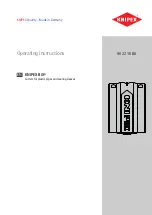
2.50mm Pitch Floating Wire-to-Board Plug Crimp Terminal
Doc No: ATS-638255000
Release Date: 04-11-13
UNCONTROLLED COPY
Page 6 of 7
Revision: A
Revision Date: 04-11-13
Figure 12
SQUEEZE
THE LINK IN
THE HANDLE
HOLD THE HAND
TOOL IN POSITION
SETTING
WHEEL
RATCHET
RELEASE LEVER
2.
Rotate the setting wheel counter-
clockwise (CCW) to increase handle
force. The numbers will display
higher. To decrease handle force
rotate the setting wheel clockwise
(CW).
3.
Release the link to lock the setting
wheel in place.
4.
Check the crimp specifications or
conduct a pull test after tool handle
preload force is adjusted.
Warranty
This tool is for electrical terminal crimping
purposes only. This tool is made of the
best quality materials. All vital components are long life tested. All tools are warranted to be free of manufacturing
defects for a period of 30 days. Should such a defect occur, we will repair or exchange the tool free of charge.
This repair or exchange will not be applicable to altered, misused, or damaged tools. This tool is designed for
hand use only. Any clamping, fixturing, or use of handle extensions voids this warranty.
CAUTION
: Molex crimp specifications are valid only when used with Molex terminals and tooling.
CAUTIONS:
1.
Manually powered hand tools are intended for low volume or field repair. This tool is
NOT
intended for
production use. Repetitive use of this tool should be avoided.
2.
Insulated rubber handles are not protection against electrical shock.
3.
Wear eye protection at all times.
4.
Use only the Molex terminals specified for crimping with this tool.
Certification
Molex does not certify or re-certify hand tools but rather supplies the following guidelines for customers to re-certify
hand tools.
%
This tool is qualified to pull force only. To re-certify, crimp a terminal to a wire, which has been stripped
12.7mm (1/2”) long, so there is no crimping of the insulation. Pull the terminal and wire at a rate no faster than
25mm (1.00”) per minute. See the Molex web site for the Quality Crimp Handbook for more information on pull
testing.
%
If the tool does not meet minimum pull force values, handle preload should be increased and the pull test
rerun, (See How to Adjust Preload).
%
When the hand tool is no longer capable of achieving minimum pull force, it should be taken out of service and
replaced.

























